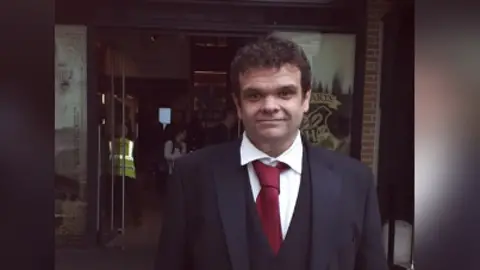'No value' in dyslexia diagnoses, says academic
 Durham University
Durham UniversityAn academic is urging experts and educators to stop diagnosing dyslexia.
Durham University professor Julian Elliott said diagnoses held "no value" in terms of educational interventions for poor readers.
"Dyslexia can be a helpful term to describe severe and persistent difficulty with reading, but that's it," he said.
However, British Dyslexia Association (BDA) chief executive Chivonne Preston argued a diagnosis "does hold value - for the individual, for their learning, for their mental health and for their future".
In a statement issued ahead of a speech at the BDA's annual conference, Prof Elliot said it was impossible to separate children who found reading difficult because of dyslexia and those who were poor readers for other reasons.
"There is no form of intervention that is specific for those diagnosed as dyslexic, as opposed to other struggling readers," he added.
Prof Elliott, who is an educational psychologist, said "the most effective and early forms of intervention" did not require a diagnosis.
He added the diagnosis process itself could exclude struggling readers from support and dyslexia should be see as an "educational difficulty, not a diagnosable 'medical' condition".
 Clare Pounder
Clare PounderJamie Sample, from Middlesbrough, said his dyslexia diagnosis just before university allowed him to access support.
"I thought I'd never get to university, let alone get the grades I did," he said.
"Without the support I got because of my diagnosis, I wouldn't have gone."
He said the diagnosis, which came after years of struggling at school, opened doors and helped him to develop ideas in a more understanding environment.
"You have to have evidence of a diagnosis before anything can be put in place," he said.
"If this professor has his way, we could lose some amazing, intelligent people who could come up with a cure for cancer or new technology.
"Without a diagnosis and help, nobody would ever know about the potential of children who don't have a diagnosis."
Defining dyslexia
Ms Preston said Prof Elliott's comments were part of a debate that had been going on "for well over a century" and defining dyslexia was complex.
Experts agreed reading difficulties had various causes and everyone should have the support they needed, she said.
"Whilst it is critical that the definition of dyslexia evolves in line with scientific evidence, dyslexia does indeed exist, and dyslexic learners need to be identified and provided with appropriate support," she said.
Kay Carter, the chief executive of another charity, The Dyslexia Association, said support should not be reliant on a diagnosis.
But the effect of formal assessments and diagnoses could be "transformational" for individuals, she said.
Follow BBC Sunderland on X (formerly Twitter), Facebook and Instagram. Send your story ideas to [email protected].
